During the Indian Mobile Congress (IMC) event, 2020, Bharat Kumar Jog, an official from the Department of Telecommunications (DoT), said that India’s share of economic value worldwide when it comes to 5G will be close to $1 trillion by 2035. But for that, he highlighted, the industry must be availed with 5G spectrum or airwaves at an affordable price. He asked the government to act fast and expedite the process of national policy implementation unveiled in 2018. More details on the story ahead.
Telcos Must Receive the 5G Spectrum at an Affordable Cost
The high price set by the regulator for the 5G spectrum or airwaves has sparked multiple debates and concerns with the early possible rollout of 5G in India. Telcos have also communicated their thoughts on lowering the costs of the 5G spectrum with the government. The same concern was highlighted by the DoT official, Bharat Kumar Jog on the second day of the IMC 2020. He said that new policy initiatives from the government have to be introduced early and the policies must ensure that telcos get the 5G spectrum at an affordable cost. For the unaware, the telecom regulator of the country has set the price of the 5G spectrum in the 3300 - 3600 MHz bands at around Rs 492 crore per unit. Looking at the steep price, Bharti Airtel has already expressed its doubts over participating in the next sale of airwaves by the government. At the same time, the Telecom Regulatory Authority of India has left the matter of the pricing on the hands of the government. The regulator has backed off saying that it won’t reduce the price, but if the government wants to review the pricing, it can. Jog also added that the implementation of the National Digital Communication policy introduced in 2018 needs to be done by the government fast now. He believes that the policy has the ability to empower India digitally and look after the well being of the country. In the end, Jog said that the economic value of 5G worldwide is expected to be $13.2 trillion by 2035, out of which India is expected to contribute up to $1 trillion.
